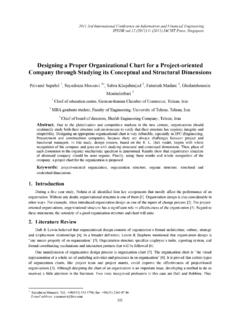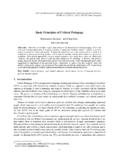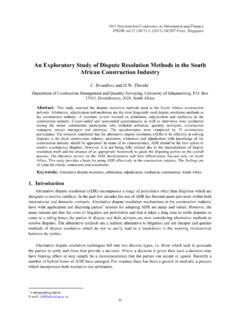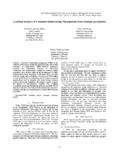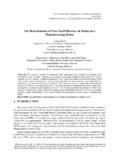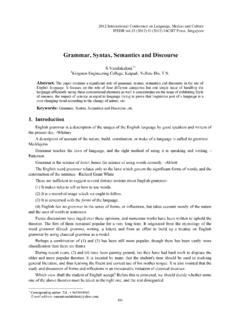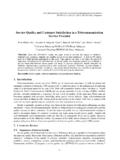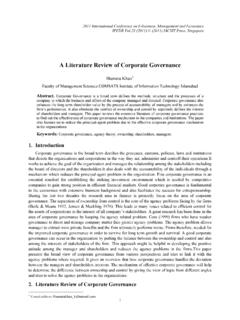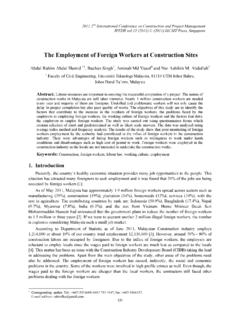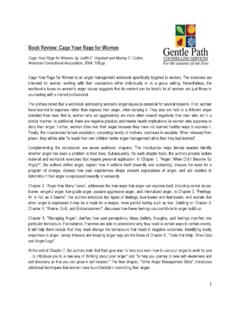Transcription of Review of studies on infidelity - IPEDR
1 Review of studies on infidelity Bahareh Zare1+ 1 Islamic Azad University, Marvdasht branch, marvdasht, shiraz, iran. Abstract. This paper reviews empirical studies over the past decades from all over the world in order to assess what researchers have done about infidelity issue and identify gaps in the literature where further research is needed. These studies are categorized into eight groups: 1) Different types of infidelity 2) Gender difference in infidelity 3) Education level and infidelity 4) Genetic effect on infidelity 5) Personality and infidelity 6) Reasons of infidelity 7) Consequences of infidelity 8) infidelity and treatments. The existing body of knowledge relating to these groups of studies will be summarized in this paper.
2 Key words: infidelity , Personality, Gender, Education Level, Genetic Effect. 1. Introduction Nowadays, infidelity is a most important reason of divorces. Based on research reports, 90% of all divorces involve infidelity . The most consistent data on infidelity drives from the General Social Survey which sponsored by the National Science Foundation to track the opinions of Americans about social behaviors since 1972. The survey data shows that in any given year, about 10% of married couples (12% men and 7% of women) have engaged in sex outside their marriage. But detailed analysis of the data from 1991 to 2006 shows surprising shifts. University of Washington researchers have found that the rate of lifetime infidelity for men over 60 increased to 28% in 2006 from 20% in 1991.
3 For women over 60, this rate increased from 5% in 1991 to 15% in 2006 (Barker, 2011). As a consequence, infidelity becomes an important issue in psychology literature which attracts lots of attention of researchers. Also infidelity has been investigated within a variety of perspective in the literature like reasons, types, cues, education level, gender difference, treatment, personality of spouses and so on. The main purpose of this article is to summarize these studies in specific groups and provide the comprehensive and classifying of researches that have done about this topic. 2. infidelity Definition infidelity (colloquially known as cheating) most commonly refers to a breach of the expectation of sexual exclusivity.
4 infidelity can comprise a number of activities including: "Having an affair", "extramarital relationship", "cheating", "sexual intercourse", "oral sex" ,"kissing", "fondling", "emotional connections that are beyond friendships", "friendships", "internet relationships", "pornography use", and others (Blow and Hartnett, 2005). In most cultures, during intimate relationships, there is usually an express or implied expectation of exclusivity, especially in sexual matters. infidelity is defined as unfaithfulness by virtue of being unreliable and the cheating on a relationship partner that takes place despite a commitment to exclusiveness. Sexual infidelity by a marriage partner is commonly called philander, adultery or an affair.
5 What constitutes an act of infidelity varies within cultures and depends on the type of relationship that exists between people. Even within an open relationship, + Corresponding author. Tel.: 0060173570024 E-mail address: 1822011 3rd International Conference on Advanced Management Science IPEDR (2011) (2011)IACSIT Press, Singapore infidelity may arise if a partner in the relationship acts outside of the understood boundaries of that relationship. Different studies have been done on infidelity that they can be divided into eight different groups. Figure1 shows this classification that has been introduced in this article.
6 These groups of studies will be discussed in the following section. Figure1: Different groups of studies on infidelity 3. Different Types of infidelity One group of studies on infidelity emphasize on different types of infidelity including: one night stands, emotional connections, long-term relationship and philandering, having an affair, extramarital relationship, cheating, sexual intercourse, oral sex, kissing, fondling, friendships, internet relationships and pornography use (Blow and Hartnett, 2005). However, most of the literature divided infidelity to more specific categories including sexual infidelity , emotional infidelity , combined sexual and emotional infidelity and internet infidelity (Glass, 1985).
7 Moreover, within each general category there are different subgroups. For example emotional infidelity could consist of a work relationship or a long-distance phone. Sexual infidelity could consist of visiting sex workers, same sex encounters and different types of sexual activities. Beatriz (2007) investigated another type of infidelity ; online infidelity which definite as a process whereby individuals involved in a long-term committed relationship seek computer synchronous interactive contact with opposite sex member. Mackenzie (2011) classified infidelity into 3 types: sexual infidelity , emotional infidelity and full investment infidelity . According to Mackenzie (2011), sexual infidelity is a relationship with someone outside of the marriage that is purely or primarily sexual in nature (there is little or no emotional attachment).
8 Actually, sexual infidelity in this study wasn t limited to intercourse and it contains any sexual activity that breaks the trust of sexual exclusivity within a marriage such as sexual kissing and heavy petting. It is also includes activities where there is no physical contact at all, such as telephone or online sex due to this fact that the offender is investing sexuality outside of the marriage. 4. Gender difference in infidelity This group of studies divided into two parts. The first group of researches focused on sex differences in reaction to a partner s infidelity (Shackelford & Buss, 2002; Brackens, 2011). Sex differences in reaction to a partner s emotional and sexual infidelity are well documented and hypothesized adaptive problems (Buss et al.)
9 1992; Buss & Shackelford, 2004). Due to adaptive problem of parental uncertainly, men are more upset than women by a partner s sexual infidelity . Also, adaptive concern with parental investment and resources diversion makes women feel more upset than men by a partner emotional infidelity (Buss et al. 1992; Buss & Shackelford 1997; Shackelford et al. 2000). Another part of literature about sex differences and infidelity refers to different rates of men and women involvement in infidelity . Some researchers strongly assert that men are more engage in infidelity than women (Allen & Baucom, 2004, Atkins et al. 2001). They have significantly more sexual partners outside of their primary relationship (Blumstein & Schwartz, 1983) and they have more permissive attitudes toward sex outside of marriage (Liberman, 1988; Thompson, 1984) and also have a strong desire to engage in infidelity (Prins 1993).
10 At the same time, other studies suggest that men and women s rate of infidelity are becoming increasingly similar (Oliver & Hyde, 1993) and they are not differing in terms of behavior (Prins et al. 1993). 1835. Education level and infidelity Different studies report various results about the impact of education level on infidelity . Atkins et al (2001) found that highly educated people are more likely to engage in extramarital sex. They concluded that there is a significant relationship between divorce and education levels and the correlation between education and infidelity is only significant for couples who are divorced (Atkins et al. 2001). In another national study, Forste and Tanfer (1996) concluded that education has a significant correlation with infidelity in married women who are differ in case of degree and their partner s education level.
